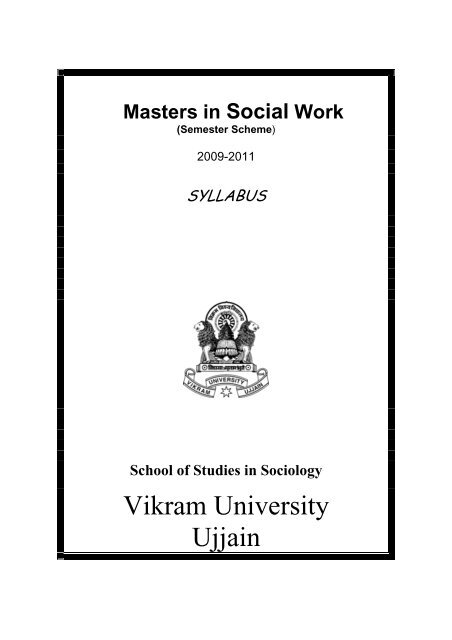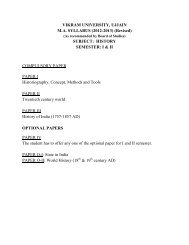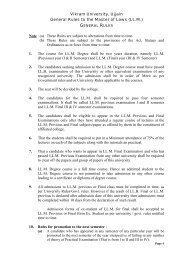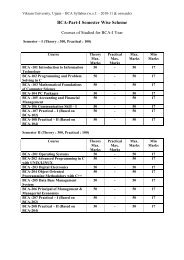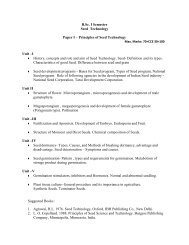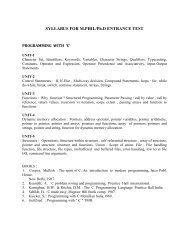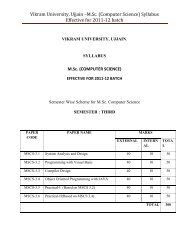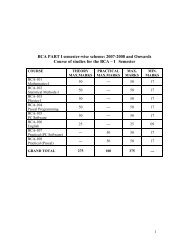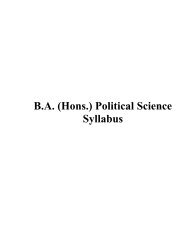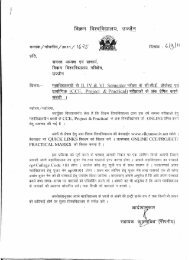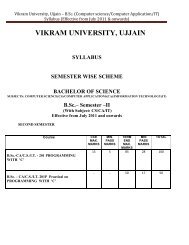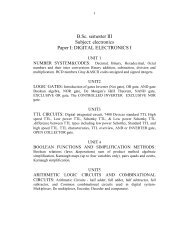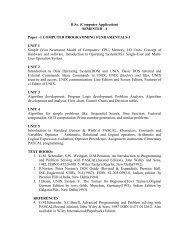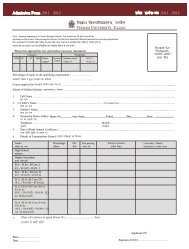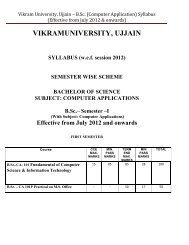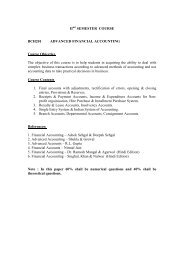MSW 2009-11.pdf - Vikram University
MSW 2009-11.pdf - Vikram University
MSW 2009-11.pdf - Vikram University
Create successful ePaper yourself
Turn your PDF publications into a flip-book with our unique Google optimized e-Paper software.
Masters in Social Work<br />
(Semester Scheme)<br />
<strong>2009</strong>-2011<br />
SYLLABUS<br />
School of Studies in Sociology<br />
<strong>Vikram</strong> <strong>University</strong><br />
Ujjain
Semester<br />
Semester I<br />
<strong>MSW</strong> Course Semester-I<br />
Year <strong>2009</strong>-2011<br />
Course Structure<br />
Paper<br />
Paper I<br />
Paper<br />
Nomenclature<br />
Introduction to<br />
Social Work<br />
Internal<br />
assessments<br />
Marks<br />
Written<br />
Papers<br />
Total<br />
30 70 100<br />
Paper II<br />
Paper III<br />
Paper IV<br />
Paper V<br />
Sociology for<br />
Social Workers<br />
Human Growth<br />
and Development<br />
Social Works<br />
Profession:<br />
Methods and<br />
Strategies<br />
Basics of Social<br />
Science Research<br />
Observational<br />
Group Visit<br />
30 70 100<br />
30 70 100<br />
30 70 100<br />
30 70 100<br />
Total A 500<br />
30<br />
Field Work<br />
Project<br />
Concurrent Visit 25<br />
Bibliography 20<br />
Case Work 25<br />
Total B 100<br />
Total A+B 600<br />
Page 1 of 2, C:\Inetpub\wwwroot\university\syl7710\<strong>MSW</strong> <strong>2009</strong>-11.doc
Scheme <strong>MSW</strong> (Semester-II )<br />
Year <strong>2009</strong>-2011<br />
Course Structure<br />
Semester<br />
Paper<br />
Paper<br />
Nomenclature<br />
Internal<br />
assessments<br />
Marks<br />
Written<br />
Papers<br />
Total<br />
Semester II<br />
Paper I<br />
Social Policy<br />
and Planning<br />
30 70 100<br />
Paper II<br />
Social<br />
Problems<br />
30 70 100<br />
Paper III<br />
Therapeutic<br />
Process and<br />
Counselling<br />
30 70 100<br />
Paper IV<br />
Social Works<br />
Profession:<br />
Training and<br />
Development<br />
30 70 100<br />
Paper V<br />
Social Work<br />
Research<br />
30 70 100<br />
Total A 500<br />
Concurrent<br />
Visit<br />
25<br />
Field Work<br />
Project<br />
Case story 25<br />
Group Work 25<br />
Small Scale<br />
Survey<br />
25<br />
Total B 100<br />
Total A+B 600<br />
Page 2 of 3, C:\Inetpub\wwwroot\university\syl7710\<strong>MSW</strong> <strong>2009</strong>-11.doc
Semester<br />
Semester III<br />
Scheme <strong>MSW</strong> (Semester-III)<br />
Year <strong>2009</strong>-2011<br />
Course Structure<br />
Paper<br />
Paper I<br />
Paper II<br />
Paper III<br />
Paper<br />
Nomenclature<br />
Issues of<br />
Development<br />
Organizational<br />
Management<br />
Guidance and<br />
Counselling<br />
Marks<br />
Internal Written<br />
Total<br />
assessments Papers<br />
30 70 100<br />
30 70 100<br />
30 70 100<br />
Paper IV* Specialization 30 70 100<br />
A, B, C, D<br />
Total A 400<br />
Field Work OGV 30<br />
Job Oriented<br />
Project<br />
Synopsis<br />
Presentation<br />
35<br />
35<br />
Total B 100<br />
Grand Total A+B 500<br />
* Note: In Paper IV students have to choose one paper out of 4<br />
Specializations A, B, C and D. They have to continue with the<br />
same specialization in Semester IV.<br />
Specialization:<br />
A--<br />
B--<br />
C--<br />
D--<br />
Human Resource Management<br />
Rural and Tribal Development<br />
Medical Social Work<br />
Women Welfare<br />
Page 3 of 4, C:\Inetpub\wwwroot\university\syl7710\<strong>MSW</strong> <strong>2009</strong>-11.doc
Scheme <strong>MSW</strong> (Semester-IV)<br />
Year <strong>2009</strong>-2011<br />
Course Structure<br />
Semester<br />
Semester IV<br />
Paper<br />
Paper I<br />
Paper II<br />
Paper<br />
Nomenclature<br />
Basics of<br />
Communication<br />
Skills<br />
Basics of<br />
Computer<br />
Application<br />
Marks<br />
Internal<br />
assessments<br />
External/Written<br />
Papers<br />
Total<br />
30 70 100<br />
30 70 100<br />
Paper III *<br />
Specialization<br />
A, B, C, D<br />
30 70 100<br />
Paper IV** Dissertation 30 70 100<br />
Field Work<br />
i. Organization<br />
Profile<br />
ii. Community<br />
Profile<br />
iii. Social Case<br />
Work<br />
Comprehensive<br />
Viva<br />
Total A 400<br />
50<br />
50<br />
Total B 100<br />
Total A+B 500<br />
* Note: In paper III, students have to choose one paper out of 4<br />
Specializations A, B, C and D. They have to continue with the<br />
same specialization in paper III Semester IV.<br />
** Dissertation is compulsory for every student. Dissertation<br />
has to be chosen by the students in consultation with the teacher.<br />
The topic will be from the specialization which the student has<br />
opted.<br />
Specialization:<br />
A--<br />
B--<br />
C--<br />
D--<br />
Labour Welfare Legislation<br />
Urban Community Development<br />
Psychiatric Social Work<br />
Child Welfare<br />
Page 4 of 5, C:\Inetpub\wwwroot\university\syl7710\<strong>MSW</strong> <strong>2009</strong>-11.doc
Detail Syllabus<br />
SEMESTER I<br />
Paper-I Introduction to Social Work<br />
Unit I:<br />
1. Emergence of Social Work from Charity to Social Work<br />
2. History of Social Work in U K, America<br />
3. History of Social Work in India<br />
4. Social Work and other Social Sciences<br />
Unit II:<br />
1. Social Welfare- Meaning, Need and Importance<br />
2. Concept of Welfare State<br />
3. Terms related to Social Work- Social Policy, Social Reform,<br />
Social Security, Social Insurance, Social Legislations, Social<br />
Defence.<br />
Unit III<br />
1. Fields of Social Work in India<br />
2. Tribal Community<br />
3. Rural Community Developments<br />
4. Urban Community Developments<br />
Unit IV<br />
1. Labour Welfare<br />
2. Families and Child Welfare<br />
3. Medical and Psychiatric Social Work<br />
4. Welfare of Physically, Mentally and Socially Handicapped<br />
Unit V<br />
1. Social Work for Aged<br />
2. Social Work with Drug Abuse<br />
3. Social Work with Criminals<br />
4. Social Work for Deprived Population.<br />
Suggested Reading:<br />
lekt dk;Z %& th- vkj- enku] foosd izdk’ku ubZ fnYyh A<br />
lekt dk;Z bfrgkl i)fr;k %& Mk0 lqjsUnz flag] fgUnh xzUFk vdkneh y[kum A<br />
Hkkjr esa lekt dk;Z %& Mk0 lqjsUnzflag] fgUnh xzUFk vdkneh y[kum A<br />
lekt dk;Z dk bfrgkl %& ih-Mh- feJ] fgUnh xzUFk vdkneh y[kum A<br />
Page 5 of 6, C:\Inetpub\wwwroot\university\syl7710\<strong>MSW</strong> <strong>2009</strong>-11.doc
SEMESTER I<br />
Paper-II Sociology for Social Workers<br />
Unit I<br />
1. Sociology as part of Social Science.<br />
2. Concept and Meaning: Society, Association, Institution,<br />
Community, Status and Role<br />
3. Structural and Functional aspect of Society<br />
Unit II<br />
1. Culture: Meaning, Types and Attributes.<br />
2. Traditions, Customs, Norms, Values and Folkways.<br />
3. Social Control: Meaning and importance.<br />
Unit III<br />
1. Social Institutions: Family, Marriage, Kinship,<br />
2. Religion:<br />
3. Social Groups: Meaning and Types.<br />
Unit IV<br />
1. Composition of Indian Society<br />
2. Social Classification (Rural & Urban)<br />
3. Stratification in India (caste & class )<br />
Unit V<br />
1. Social Change: Concept<br />
2. Theories (Tradition, Modernity, Liberalization, Privatization<br />
and Globalization)<br />
3. Dominate Social Movement& Reformers.<br />
Suggested Readings:<br />
J.P. Singh: Sociology, Prentice Hall of India, N. Delhi<br />
S.C. Dube, India Society, National Book Trust<br />
;ksxsUnz flag] Hkkjrh; iajeijkvksa dk vk/kqfudhdj.k] jkor ifCyds'ku<br />
N. Jayaram, (1989) Sociology: Methods and Theory, Madras: Macmillan.<br />
Page 6 of 7, C:\Inetpub\wwwroot\university\syl7710\<strong>MSW</strong> <strong>2009</strong>-11.doc
SEMESTER I<br />
Paper –III<br />
Human Growth & Development<br />
Unit I:<br />
1. Determinates of Human Behaviour : Heredity and Environment,<br />
2. Life span Approach to Human Development,<br />
3. Pre conception, Conception and Post-natal Situations<br />
Unit II:<br />
1. Infancy and Babyhood: Development Tasks, Characteristics and<br />
Hazards.<br />
2. Childhood: Development Tasks, Characteristics and Hazards.<br />
3. Puberty: Development Tasks, Characteristics and Hazards.<br />
Unit III:<br />
1. Adolescence: Development Tasks, Characteristics and Hazards.<br />
2. Adulthood: Development Tasks, Characteristics and Hazards.<br />
Unit IV:<br />
1. Middle age: Development Tasks, Characteristics and Hazards.<br />
2. Old age: Development Tasks, Characteristics and Hazards<br />
Unit V:<br />
1. Human Behaviour, Dynamics of Human Behaviour,<br />
2. Basic Human Needs,<br />
3. Different Theories of Human Behaviour.<br />
Suggested Readings:<br />
Hurlock, E.D Development Psychology: A life Span Approach, Tata McGraw<br />
Hill, New Delhi.<br />
Page 7 of 8, C:\Inetpub\wwwroot\university\syl7710\<strong>MSW</strong> <strong>2009</strong>-11.doc
SEMESTER I<br />
Paper IV Social Work Profession: Methods and<br />
Strategies<br />
Unit I:<br />
1. Social Work: Meaning, Nature, Scope, Objectives, Values and<br />
Principles.<br />
2. Social Work as a Profession: Attributes of a Profession Social<br />
Work, Professional Ethic.<br />
3. Integrated Approach to Social Work<br />
4. Professional Organizations – National & International<br />
Unit II:<br />
1. Social Case Work: Nature, Definition, Purpose and Principles<br />
2. Components and Process of Working with Individuals<br />
3. Historical Development & Current Application.<br />
Unit III:<br />
1. Tools of Social Case Work: Interviewing, Home Visit,<br />
Relationship, Observation, Listening etc.<br />
2. Models: Psychosocial Model, Problem Solving, Functional<br />
Model, Crisis Intervention & Family Therapy in the Indian<br />
context<br />
3. Application of Social Case Work: History Taking, Interviewing<br />
and Recording<br />
4. Role of Social Case Worker: Enables, Facilitator, Guide &<br />
Resource Mobilizer in various setting & its limitations<br />
(Children, women, physical & Mentally Challenged)<br />
Unit IV:<br />
1. Social Group Work: Nature and Definition<br />
2. Purpose and Principles of Working with Groups.<br />
3. Group Dynamics, Types of Group<br />
4. Group Formations, Group Cohesiveness.<br />
5. Historical Development & Current application<br />
Unit V:<br />
1. Determination, Phases of Group Work and Recording.<br />
2. Role of Group Worker: Enables, Guide, Facilitator and<br />
Therapist<br />
3. Application of Social Work with Groups in various settings and<br />
its limitations (Hospital, School & Family Welfare etc)<br />
Suggested Reading<br />
Hamilton, Gerden - The Theory and practice of Social case Work<br />
Trecker, H.B: Social Group Work Principles and Practice, New York<br />
Association press<br />
Grace Mathew, An Introduction to Social Case Work<br />
Encyclopaedia of Social Work, Ministry of Social Welfare, Government of<br />
India.<br />
Page 8 of 9, C:\Inetpub\wwwroot\university\syl7710\<strong>MSW</strong> <strong>2009</strong>-11.doc
SEMESTER I<br />
Paper V Basics of Social Science Research<br />
Unit I:<br />
1. Research: Nature and Concept<br />
2. Nature and Characteristics of Scientific Methods.<br />
3. Meaning & Definition of Research<br />
4. Nature, Scope and Importance of Research<br />
Unit II:<br />
1. Types of Social Science Research : Qualitative and Quantitative<br />
2. Research Design: Characteristics, Objectives and Process<br />
3. Types of Research : Historical, Descriptive, Analytical<br />
Experimental<br />
Unit III:<br />
1. Research Process and Planning for Research.<br />
2. Formulation of Research Problem.<br />
3. Level of Measurement in Social Research.<br />
Unit IV:<br />
1. Sampling: Meaning and Importance<br />
2. Types of Sampling<br />
3. Sampling Design<br />
Unit V:<br />
1. Hypothesis: Characteristics, Dimension, Sources<br />
2. Importance Hypothesis in Social Work<br />
3. Data Collection: Sources and Techniques<br />
Suggested Reading:<br />
jfoUnzukFk eqdthZ % lkekftd 'kks/k ,oa lkf[;adh] foosd izdk’ku] ubZ fnYyh A<br />
ih-,u- f=osnh % fjlpZ eSFkksykTkh] dkyst cqd fMiks t;iqj A<br />
Page 9 of 10, C:\Inetpub\wwwroot\university\syl7710\<strong>MSW</strong> <strong>2009</strong>-11.doc
SEMESTER II<br />
Paper I Social Policy and Planning<br />
Unit I<br />
1. Social Policy – Meaning, Scope and Concept<br />
2. Need, Component and Process of Social Policy<br />
3. Basic Elements of Social Policy<br />
Unit II<br />
1. Approaches of Planning<br />
2. Concept of Developed and Developing countries.<br />
3. Planning for various Economic Systems.<br />
Unit III<br />
1. Indian Planning Process<br />
2. Planning Commission & Five Year Plans<br />
3. Panchayati Raj<br />
Unit IV<br />
1. Voluntary Sector in India – Role & importance.<br />
2. Social Administration – Concept and Principles.<br />
3. Social Administration at Central Level, State level and local<br />
level<br />
Unit V Plans and Programmes of<br />
1. Health<br />
2. Education<br />
3. Women and Child<br />
Suggested Reading:<br />
Gour Ajay Singh,Social Administration, Vivek Publications<br />
Five Years Plans, Government of India<br />
Madan,G.R, Chang and Development , Vivek Publications, Jaipur<br />
Encyclopaedia of Social Work, Ministry of Social Welfare, Government of<br />
India.<br />
Page 10 of 11, C:\Inetpub\wwwroot\university\syl7710\<strong>MSW</strong> <strong>2009</strong>-11.doc
SEMESTER II<br />
Paper II Social Problems<br />
Unit I<br />
1. Social Problems: Meaning, Definition, Approaches and<br />
Treatment<br />
2. Social Problems in India: Poverty, Illiteracy, Unemployment,<br />
Malnutrition<br />
3. Problem of ST & SC, Other Backward Communities, Destitute,<br />
Aged, Widows, Orphans<br />
Unit II:<br />
1. Problem of Child Labour, Street children, School dropouts,<br />
Drug abuse<br />
2. Problem of Small, Marginal Farmers and landless agricultural<br />
labourers<br />
3. Problem of Juvenile Delinquent, Immoral Trafficking among<br />
Women and Young girls. Prostitution and Commercial<br />
Exploitation of women.<br />
Unit III:<br />
1. Social Issues and the Environment<br />
2. Water Conversation, Rain Water Harvesting, Watershed<br />
Management<br />
Unit IV:<br />
1. Air Pollution, Water Pollution, and Soil Pollution: Causes,<br />
Effects and Control measures<br />
2. Marine Pollution, Noise Pollution, Thermal Pollution, Nuclear<br />
Hazards: Causes, Effects and Control measures<br />
Unit V:<br />
1. Resettlement and Rehabilitation of People: Its problems and<br />
concerns<br />
2. Disaster Management: Floods, Earthquakes, Cyclones, and<br />
Landslides.<br />
Suggested Reading:<br />
Jayaram, N.: 1989. Sociology: Methods and Theory, Madras: MacMillian.<br />
Page 11 of 12, C:\Inetpub\wwwroot\university\syl7710\<strong>MSW</strong> <strong>2009</strong>-11.doc
SEMESTER II<br />
Paper III<br />
Therapeutic Process and Counselling<br />
Unit I:<br />
1. Perception, Learning,<br />
2. Memory, Emotion,<br />
3. Motivation<br />
Unit II:<br />
1. Personality: Definition, Types, Structure and Factors<br />
influencing Personality Development<br />
2. Psycho-Sexual Development, Psycho-Social Development.<br />
Unit III:<br />
1. Defence Mechanisms,<br />
2. Counselling: Philosophy, Principles, Goals, Process.<br />
3. Types of Counselling – Development, Preventive, Facilitative,<br />
Crises.<br />
4. Techniques of Counselling<br />
Unit IV:<br />
1. Intelligence: Definition, Structure and Measurement.<br />
2. Mental Retardation: Definition, Types, Causes, Problems<br />
Unit V:<br />
1. Abnormal Psychology: Concept of Normal and Abnormal<br />
Behaviour.<br />
2. Etiological factors of Mental Illness<br />
3. Types of Mental Disorders and Classification.<br />
Suggested Reading:<br />
Coleman ; Abormal Psychology and Modern life<br />
Rao , N.S: Counselling and Guidance , Tata Mc Grew Hill<br />
Page 12 of 13, C:\Inetpub\wwwroot\university\syl7710\<strong>MSW</strong> <strong>2009</strong>-11.doc
SEMESTER II<br />
Paper IV Social Work Personal: Training and<br />
Development<br />
Unit I<br />
1. Community: Basic Concepts, Definitions, Types.<br />
2. Community Analyses: Structure and Functions<br />
3. Community Organizations: Definition & Principles<br />
4. Community Organization as a method, Community<br />
Development & Its Scope<br />
Unit II<br />
1. Strategies & Model of Community Work<br />
2. Role of Community Worker as Guide, Enabler, Therapist<br />
Researcher,<br />
3. Analyst, Project leader, Organizer & Activist in different setting<br />
(Health, Education, Correctional, Rural, Urban) and its<br />
limitations.<br />
4. Recording and current trend in Community Work<br />
Unit III<br />
1. Social Action: Concept, Purpose & Techniques.<br />
2. Social Action in Community Organization<br />
3. Social Welfare Administrations: Meaning, Definition and<br />
Principles<br />
Unit IV<br />
1. Programme Management<br />
2. Project Formulation, Evaluation & Documentation.<br />
3. Relation: Meaning, Importance, Tools of Publicity<br />
Unit V<br />
1. Annual Plan, Annual Report,<br />
2. Press release, Case Story, Donation appeal,<br />
3. Adult Learning: Principles, Tools of Adult learning.<br />
Suggested Readings:<br />
Murry, G. Ross: Community Organisation<br />
Gangrade K.D: Community Organisation in India<br />
Siddiqui H.P: Working With Communities<br />
Sachdeva: Social Welfare Administration in India<br />
Goel & Jain: Social Welfare Administration, Vol I & II<br />
Page 13 of 14, C:\Inetpub\wwwroot\university\syl7710\<strong>MSW</strong> <strong>2009</strong>-11.doc
SEMESTER II<br />
Paper V Social Work Research<br />
Unit I<br />
1. Social Work Research – Nature, Objectives, Scope, Process.<br />
2. Integrating Research and Practice.<br />
3. Research and Theory.<br />
Unit II<br />
1. Participatory Action Research – Process and Techniques<br />
2. Evaluative Research – Need , Purpose and Types<br />
3. Research Proposal, Research Report Writing.<br />
Unit III<br />
1. Primary and Secondary Data Processing.<br />
2. Data analysis: Classification, Codification and Tabulation<br />
3. Data Analysis: Uni-Variation, Bi-Variate, Tri-Variate<br />
Multivariate Analysis.<br />
Unit IV<br />
1. Diagrammatic Presentation of Data<br />
2. Measures of Central Tendency: Mean, Median & Mode.<br />
Unit V<br />
1. Graphic Presentation of Data.<br />
2. Testing of Hypothesis<br />
Suggested Readings:<br />
Young, P.V., Scientific Social Survey and Research, PHI, N Delhi<br />
D. N. Elhans, Fundamental of Statistics, Pustak Mahal, New Delhi<br />
Page 14 of 15, C:\Inetpub\wwwroot\university\syl7710\<strong>MSW</strong> <strong>2009</strong>-11.doc
SEMESTER III<br />
Compulsory Paper<br />
Paper I Issues of Development<br />
Unit I<br />
1. Development: Meaning, Concept and Approaches.<br />
2. Related terms: Growth, Progress, Change and Transformation.<br />
3. Agencies of Development.<br />
Unit II<br />
1. Human Development: Concept and HDI Report.<br />
2. Methodology and Indices (HDI, HPI, GDI, GEN, GEM)<br />
3. Status of Human Development in India.<br />
Unit III<br />
1. Social Development: Concept and Approaches.<br />
2. Indicators relating to Health and Education.<br />
3. Status of Health and Education in India.<br />
Unit IV<br />
1. Economical Development: Concept, Approaches and<br />
Measurements.<br />
2. Political Development: Concept, Approaches and<br />
Measurements.<br />
3. People’s Participation in Development.<br />
Unit V<br />
1. Social Issue and Development.<br />
2. Sustainable Development.<br />
3. Rehabilitation and Resettlement.<br />
Suggested Readings:<br />
Gore,M.S Social Development: Rawat Publications.<br />
Tyler, C.,Indian: Roots of Democracy<br />
Tarlok Singh: India’s Development Experience, Deep and Deep Pubilcation.<br />
Jhinan M.L: Vikas Ka Arth Shastra Avam Ayojan , Konark Publication td.<br />
Imbergen, Jan: Development of Planning, Londoon.<br />
Page 15 of 16, C:\Inetpub\wwwroot\university\syl7710\<strong>MSW</strong> <strong>2009</strong>-11.doc
SEMESTER III<br />
Compulsory Paper<br />
Paper II Organisational Management<br />
Unit I<br />
1. Organisation–Meaning, Definition and Forms.<br />
2. Organisation as a structure and Process.<br />
3. Designing of Organisation structure.<br />
Unit II Organisation under<br />
1. Company Act,<br />
2. Co-operative Society Act,<br />
3. Indian Trust Act, Indian Trade Union Act.<br />
4. Society Registration Act.<br />
Unit III<br />
1. Social Responsibility of Organisation.<br />
2. Organisation climate.<br />
3. Authority and Responsibility, Delegation of Authority.<br />
Unit IV<br />
1. Planning, Objectives and Forecasting.<br />
2. Decision making.<br />
3. Leadership, Motivation.<br />
Unit V<br />
1. Training and Development: Meaning and Importance.<br />
2. Identification of Training Need.<br />
3. Designing, Implementation and Evaluation of Training<br />
Programme.<br />
Suggested Readings:<br />
Sharma and Chaturvedi, Organisation and Management, Mahavir Prakashan,<br />
Delhi.<br />
Terry and Franklin, Principles of Management, AITBS, New Delhi<br />
Robins, Organizational Behaviour, New Delhi, PHI<br />
Chattopadhyaya, S and Preekh Udai, Managing Organisational Change,<br />
Oxford Mumbai<br />
Page 16 of 17, C:\Inetpub\wwwroot\university\syl7710\<strong>MSW</strong> <strong>2009</strong>-11.doc
SEMESTER III<br />
Compulsory Paper<br />
Paper III Guidance and Counselling<br />
Unit I<br />
1. Guidance: Concept, Nature, Functions, Principles and Scope<br />
2. Guidance for Personal Adjustment.<br />
3. Guidance for Vocation.<br />
Unit II<br />
1. Guidance in Community setting.<br />
2. Techniques of Guidance, Problems of Guidance<br />
3. Relationship and Difference between Guidance and<br />
Counselling.<br />
Unit III<br />
1. Information Generation: Need and Procedure.<br />
2. Cumulative Records.<br />
3. Psychological Tests: Aptitude and Attitude, Interest and Values.<br />
Unit IV<br />
1. Counselling: Nature, Scope, Goals and Objectives.<br />
2. Functions and Process.<br />
3. Approaches to Counselling.<br />
Unit V<br />
1. Counsellor – Personal Qualities and Profession Skills.<br />
2. Evaluation of Counselling.<br />
3. Counselling in Indian Context and Problems of Counselling.<br />
Suggested Readings:<br />
Rai Amarnath Asthana Madhu, Guidance and Counselling, Concept , Areas<br />
and Approaches, Motilal Banarasidas, New Delhi,<br />
Anastasi , Psychological Testing, Macmillan Co, New York<br />
Jones, A.J. Principles of Guidance, Indian Ed Bombay, Tata McGraw Hill<br />
Publishing Company Ltd.<br />
Kochhar, S.K, Guidance and Counselling in Colleges and <strong>University</strong>, New<br />
Delhi Sterling Publisher Pvt. Ltd.<br />
Page 17 of 18, C:\Inetpub\wwwroot\university\syl7710\<strong>MSW</strong> <strong>2009</strong>-11.doc
SEMESTER III<br />
Specialization (A)<br />
Paper IV Human Resource Management<br />
Unit I Human Resource Management<br />
1. Meaning, Importance and Functions of HRM,<br />
2. Role of HR Manager, Characteristics and Qualities of HR<br />
Manager.<br />
Unit II Human Resource Planning<br />
1. Meaning, Importance and Factors affecting Human Resource<br />
Planning,<br />
2. Human Resource Planning Process, Human Resource Planning<br />
at different levels.<br />
Unit III Human Problems at Work Place<br />
1. Stress- Nature, Type, Individual and organizational<br />
consequences of stress,<br />
2. Absenteeism-types, causes, consequences of absenteeism.<br />
3. Gender discrimination and sexual Harassment at the work place.<br />
Unit IV Management of Behavioural Problems<br />
1. Counselling techniques to handle-job stress, dual career and<br />
Family adjustment problems, absenteeism,<br />
2. Interpersonal relationship problem at the work place and the<br />
home affecting work performance.<br />
Unit V Comparative HRD experiences<br />
1. HRD Overview in Government and Public Systems<br />
2. HRD for Health and Family Welfare,<br />
3. HRD in Service Industry<br />
Suggested Readings:<br />
Luthan F, 1996, Organizational Behavior. New York: McGraw Hill<br />
Beard Well I and Holden L. Human Resource Management; a contemporary<br />
perspective<br />
Parweek U and Rao T.V. 1999, Designing and Managing Human Resource<br />
Systems, Anmol Publishers<br />
Moorhad G and Griffin R W. Organizational Behaviour: Managing people and<br />
organizations.<br />
Bohalander, Managing Human resources, 12th Edn., Thomson Learning<br />
Books<br />
A. M. Shaikh, Human Resource Development & Management, S. Chand Co.<br />
Page 18 of 19, C:\Inetpub\wwwroot\university\syl7710\<strong>MSW</strong> <strong>2009</strong>-11.doc
Paper IV<br />
SEMESTER III<br />
Specialization (B)<br />
Rural and Tribal Community<br />
Unit I<br />
1. Concept of Community: Community as a Social system, types<br />
& characteristics of Community,<br />
2. Rural, Urban, Tribal, Rural-Urban Continuum.<br />
3. Structure of Community: Family, Kinship, Caste Class,<br />
Religion<br />
Unit II<br />
1. Rural Power Structure and Concept of Rural Leaderships,<br />
2. Rural Migration,<br />
3. Rural Local Administration, 73 rd Amendment under Panchayati<br />
Raj.<br />
Unit III Tribal and Scheduled tribe<br />
1. Distribution of Tribes in India: Geographical, Linguistic and<br />
Economic<br />
2. Tribal Social Organisation<br />
3. Tribal of Madhya Pradesh<br />
Unit VI Tribal Problems:<br />
1. Rural Social Problems<br />
2. Community Development Programmes in India<br />
3. Tribal Development in India Policies and Programmes, Barriers<br />
to Social Development in Rural and tribal Society.<br />
Unit V<br />
1. Peoples Participation in Community Development<br />
2. Assessment of Problem of Community<br />
3. Project Planning and Evaluation<br />
4. Importance of Communication in Community.<br />
Suggested Readings:<br />
Clinard, B. Marshal: Slums and Community Development New York, the Free<br />
Press 1957<br />
Madam, GR, Indian Development Villages, Laknow print House India, 1983<br />
Desai A, R,: Peasant Struggles in India Bombay, Oxford <strong>University</strong> Press<br />
1979<br />
Page 19 of 20, C:\Inetpub\wwwroot\university\syl7710\<strong>MSW</strong> <strong>2009</strong>-11.doc
Paper IV<br />
Unit-I<br />
Unit-II<br />
Unit-III<br />
SEMESTER III<br />
Specialization (C)<br />
Medical Social Work<br />
Health and Health Care Services<br />
1. Meaning of Health, Mother and Child Health Services<br />
2. Social, Preventive and Community Medicine<br />
3. Health Education: Meaning, Objectives, Principles and methods<br />
of Health Education<br />
Common Diseases.<br />
1. Communicable diseases, Symptoms Preventions and<br />
Management of T.B Leprosy, Malaria, STD and AIDS.<br />
2. Non Communicable diseases, Symptoms Preventions and<br />
Management of Disables, Asthma, Cancer, Hypertension and<br />
Cardiac Diseases<br />
3. Epilepsy –Causes, Types and Treatment, Social Factors in<br />
Epilepsy.<br />
Health Planning<br />
1. Immunization Programme<br />
2. Family Planning- Meaning, Types and Relevance in Indian<br />
Context<br />
3. National Health Policy for Indian. Health Programmes specific<br />
to India.<br />
Unit-IV Community Health<br />
1. Community Health: Meaning and Various Programmes.<br />
2. Role of the Medical Social Workers in Community Health<br />
Programmes<br />
3. Role of Voluntary Organizations in Primary Health Care.<br />
Unit-V Health Programmes<br />
1. School Health Programme<br />
2. Need and Organization of Health Programmes in school:<br />
Anganwady, Balwady, Mid-day meals.<br />
3. Primary Health Care, WHO.<br />
Suggested Readings:-<br />
ParkK: Text Book of Preventive and Social Medicine<br />
Smith BC. Community Health<br />
Gesudian CAK: Primary Health Care<br />
Pathak SH: Medical Social Work<br />
Mechanie D: Medical Sociology<br />
Upham F: Dynamic Approach to Illness<br />
Lok Sabha Secretariat: National Health Policy<br />
Page 20 of 21, C:\Inetpub\wwwroot\university\syl7710\<strong>MSW</strong> <strong>2009</strong>-11.doc
Paper IV<br />
SEMESTER III<br />
Specialization (D)<br />
Women Welfare<br />
Unit I<br />
1. Atrocities against women: Dowry Death, Wife Battering,<br />
Murder Female Feticide and infanticide and sati.<br />
2. Theory of Violence: Theoretical proposition and approach.<br />
3. Changing situation of women in Indian Society.<br />
Unit II<br />
1. Problems of women with reference to religious communities in<br />
India.<br />
2. Problem of unmarried mothers, Destitute.<br />
3. Violence against women: Rape Sex Delinquency, Prostitution<br />
and Commercial Exploitation of women.<br />
Unit III<br />
1. Women’s Health status in India Factors affecting the Health<br />
status of Women.<br />
2. Family Planning Programme & Methods in India<br />
Unit IV<br />
1. Policies relating to women’s Welfare<br />
2. Programme relating to Women’s Welfare<br />
Unit V<br />
1. Constitutional Provision and legislation measures for women<br />
2. Democratization and women leadership.<br />
3. Intervention of national and international voluntary agencies in<br />
area of women welfare.<br />
Suggested Readings:-<br />
Gajender Gadger,Diabled in India, Somiya Publication, New Delhi.<br />
Visuvardhan, S.J, Deviant Children:Visuthaby Publications, Madras.<br />
Sumitra Gupta, Social Welfare in India,Chaugh Publications, Allahabad.<br />
Page 21 of 22, C:\Inetpub\wwwroot\university\syl7710\<strong>MSW</strong> <strong>2009</strong>-11.doc
SEMESTER IV<br />
Compulsory Paper<br />
Paper I Basics of Communication Skills<br />
Unit I<br />
1. Communication: Definition, Nature and Process.<br />
2. Elements of Communication and Feedback.<br />
3. Principles of Effective Communication.<br />
Unit II<br />
1. Dimension and Directions of Communication.<br />
2. Means of Communication, Verbal Communication.<br />
3. SWOT Analysis.<br />
Unit III<br />
1. Non-Verbal Communication<br />
2. Body Language, Para-language, Sign Language.<br />
3. Visual and Audio Communication.<br />
4. Barriers in Communication.<br />
Unit IV<br />
1. Written Formal Communication: Concept and types.<br />
2. Advantages, Disadvantages, Important and Need.<br />
3. Essentials of Effective letter writing.<br />
Unit V<br />
1. Modern Forms of Communication<br />
2. Fax, E-mail and Video Conferencing.<br />
Suggested Reading:<br />
Rao, N & Das ,Communication Skills, Himalaya Publication House, Mumbai.<br />
Murphy, Herta and Peck, Carles, “Effective Communication” Tata Mc Hill,<br />
New Delhi.<br />
Kitty O Locker, “Bussiness and Administrative Communication” THM, New<br />
Delhi.<br />
Page 22 of 23, C:\Inetpub\wwwroot\university\syl7710\<strong>MSW</strong> <strong>2009</strong>-11.doc
Paper II<br />
SEMESTER IV<br />
Compulsory Paper<br />
Basics of Computer Application<br />
Unit I Introduction to Computer:<br />
1. Types of Computer, Hardware, Storage device, Software and<br />
their types.<br />
2. Causes and Utility of Computer in Social Science.<br />
Unit II Operating System: DOS, Windows<br />
1. Meaning of Operating System, Dos Commands, Internal DOS<br />
Commands and External Dos Commands.<br />
2. Components of Windows.<br />
3. Basic Tasks of Window.<br />
Unit III Internet and E-mail.<br />
1. Internet: History of internet, Essential Components of internet,<br />
Uses of internet, Internet service provider.<br />
2. E-mail- Uses and Advantages of e-mail.<br />
Unit IV Microsoft office I: Word, Excel<br />
1. Introduction to MS word, Editing a Document, Previewing<br />
Documents, Printing Documents,<br />
2. Creating Worksheets in Excel, Entering Data in Excel,<br />
Managing Worksheet.<br />
Unit V Microsoft office II: Power Point.<br />
1. Utility of Power point<br />
2. Customising Power Point, Preparing Slide Practical.<br />
Suggested Readings:<br />
Computer Today, McGraw Hills<br />
Devendra Singh, Dynamic Computer Course, Fusion Books<br />
Computer Fundamentals, P.K Sinha, BPB Publication, New Delhi<br />
Page 23 of 24, C:\Inetpub\wwwroot\university\syl7710\<strong>MSW</strong> <strong>2009</strong>-11.doc
SEMESTER IV<br />
Specialization (A)<br />
Paper IV Labour Welfare Legislation<br />
Unit I Introduction to labour legislation<br />
1. Philosophy of Labour Laws<br />
2. Labour Laws, Industrial Relations and Human Resource<br />
3. Labour Laws: Concept, Origin, Objectives and Classification<br />
4. Indian Constitution and Labour Legislations<br />
5. Labour Policy, Emerging Issues and Future Trends<br />
Unit II Laws on Working Conditions<br />
1. The Factories Act, 1948<br />
2. Contract Labour (Prohibition and Regulation Act, 1986)<br />
3. Child Labour (Prohibition and Regulation Act, 1986)<br />
Unit III Industrial Relations laws<br />
1. Trade Union Act, 1926<br />
2. Industrial Disputes Act, 1947<br />
3. Industrial Employment (Standing Orders) Act, 1946<br />
Unit IV Wages and labour laws<br />
1. Minimum wages Act, 1948<br />
2. Payment of Wages Act, 1936<br />
3. Payment of Bonus Act, 1965<br />
4. Equal Remuneration Act, 1976<br />
Unit V Laws for Labour welfare and Social Security<br />
1. Social Security Legislation: An Overview<br />
2. The Workmen’s Compensation Act, 1923<br />
3. The Employees’ State Insurance Act, 1948<br />
4. The Maternity Benefit Act, 1961<br />
5. The Payment of Gratuity Act, 1972<br />
Suggested Readings:<br />
Beatsen (ed.), Anson's Law of Contract (27th ed. 1998)<br />
P.S.Atiya, Introduction to the Law of Contract 1992 reprint (Claredon Law<br />
Series)<br />
Avtar Singh, Law of Contract (2000) Eastern, Lucknow<br />
G.C.Cheshire, and H.S.Fifoot and M.P. Furmston, Law of Contract (1992)<br />
ELBS with Butterworths<br />
M. Krishnan Nair, Law of Contracts, (1998)<br />
G.H. Treitel, Law of Contract, Sweet & Maxwell (1997 Reprint)<br />
Page 24 of 25, C:\Inetpub\wwwroot\university\syl7710\<strong>MSW</strong> <strong>2009</strong>-11.doc
Paper IV<br />
SEMESTER IV<br />
Specialization (B)<br />
Urban Community Development<br />
Unit I<br />
1. Urban Community: Concept and Characteristic.<br />
2. Urban Ecology: Scope and Importance.<br />
3. Origin and Development of Cities.<br />
Unit II<br />
1. Urbanization: Trends in Urbanisation.<br />
2. Urban Problems in India.<br />
3. Industrialization and Growth of Slums.<br />
Unit III<br />
1. Community Disorganization: Changes in Occupational<br />
structure, Class, Caste, Gender, Family Disorganization<br />
2. Migration and its Form.<br />
3. Issues related to urban development and settlement.<br />
Unit IV<br />
1. Philosophy and Principle of Cooperation Movement<br />
2. Historical development of Cooperation movement.<br />
3. Role of Cooperation movement as a strategy with Urban and<br />
rural poor.<br />
4. Problems of Cooperative movement in India.<br />
Unit V<br />
1. Historical development of Municipal administration in India<br />
Functions of Municipalities.<br />
2. Finances and Problems of Municipal Administration<br />
3. 74 th Amendment and Municipal administration.<br />
Suggested Readings:<br />
Ross, Marruy, G, Community Organisation Theory, Principles and<br />
Practice, New York: Harper 1955<br />
Anderson, N: The Urban Community<br />
Subhash Chandra: Social Partcipation in Urban Neight hoods,<br />
National Publishing House New Delhi 1977.<br />
Desai, A.R and Pillai S.D: A profile of an India <strong>University</strong> of Bombay, 1972.<br />
Page 25 of 26, C:\Inetpub\wwwroot\university\syl7710\<strong>MSW</strong> <strong>2009</strong>-11.doc
SEMESTER IV<br />
Specialization (C)<br />
Paper IV Psychiatric Social Work<br />
Unit I Concept of Mental Health<br />
1. Meaning and Characteristics of Mental Health.<br />
2. Concept of normal and abnormal behaviour with particular<br />
reference to social work.<br />
3. Role of the Psychiatric Social Worker in hospital settings.<br />
Unit II Abnormal behaviour<br />
1. Meaning and cause of abnormal behaviour.<br />
2. Preventions- Primary, Secondary, Territory.<br />
3. Mental Retardation, Definition, Types Causes, Problem<br />
associated with mantel retardation.<br />
Unit III Diseases<br />
1. Neurosis and Psychosomatic Disorders- Treatments and<br />
Outcome.<br />
2. Schizophrenia, Paranoia, MDP, Cause, Treatments and<br />
Outcome.<br />
3. Sexual deviations - Causes, Types and Treatments.<br />
Unit IV Social Evils<br />
1. Delinquency and Crime<br />
2. Alcoholism and Drug Abuse<br />
3. Behaviour disorders of Childhood, Autism, Hyperactive,<br />
Unsocialized relation, Aggressive disorder.<br />
Unit V Therapies and Counselling<br />
1. Psychotherapy, Transactional analysis<br />
2. Family Therapy and Group Therapy<br />
3. Counselling - Family, Marital, Education, Vocational-Qualities<br />
and Skills required<br />
Suggested Readings:<br />
James C Colman: Abnormal Psychology and Modern life.<br />
Kaplan: Comprehensive Textbook of Psychiatric<br />
ICD-10 Classification of Mental and Behavioural Disorders, World Health<br />
Organisations.<br />
Bagg C, Hand Book of Psychiatry for Social Worker and Health visitors By<br />
Jayawas S.R.: Guidance and Counselling<br />
Verma R.: Psychiatric Social Work in India<br />
Rao N.S.: Counselling and Guidance<br />
Page 26 of 27, C:\Inetpub\wwwroot\university\syl7710\<strong>MSW</strong> <strong>2009</strong>-11.doc
Paper IV<br />
SEMESTER IV<br />
Specialization (D)<br />
Child Welfare<br />
Unit I<br />
1. Developmental tasks during stages of development.<br />
2. Role of Social Institution and organization like family, group,<br />
School in the development of children and preparation for<br />
different roles.<br />
Unit II<br />
1. Material and Child health services: care for the under five,<br />
Immunization.<br />
2. Disabilities of Child: Physical, Mental retardation visual<br />
disability, hearing and speech problems.<br />
Unit III<br />
1. Child Labour: Legislation measure and Causes &<br />
Consequences.<br />
2. Adoption: Legislation and other measures child marriage:<br />
Legislation and other measure<br />
3. Child Marriage: Legislative and other measures.<br />
4. Child abuse and neglect: child beggars, orphans, destitute child<br />
prostitution.<br />
Unit IV<br />
1. Family change disintegration and consequences:<br />
2. Juvenile delinquency, Street children, School dropout, strategies<br />
of social intervention dealing with children in critical situations.<br />
Unit V<br />
1. Child welfare services: Institution and non-institutional<br />
2. Role of national and inter national organisation in child welfare<br />
services.<br />
3. Rights of the Child, Constitutional provision and National<br />
Policy for Children, Major Policy measures.<br />
Suggested Readings:<br />
Girish Kumar: Samaj Karya Prikaria(Varanasi:Kalyan TathaSodha Sansthan)<br />
Raja Ram Shastri, Samaj Karya, Laknow, Hindi Granth Academy<br />
PD Kulkarni and MC Nanavati, NGOs in Changing Senario, Uppal Publishing<br />
House, New Delhi.<br />
Page 27 of 28, C:\Inetpub\wwwroot\university\syl7710\<strong>MSW</strong> <strong>2009</strong>-11.doc


